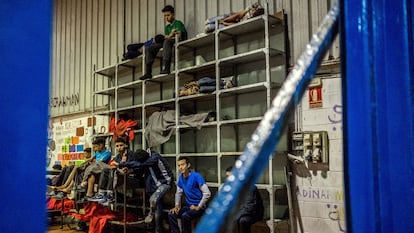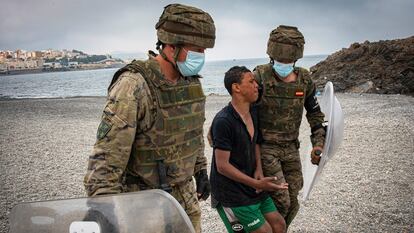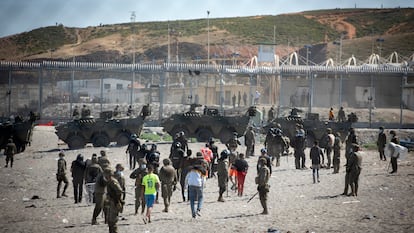Ceuta crisis: the minors on the frontline of migration chaos
Hundreds of youngsters who crossed into the Spanish city last week are staying in makeshift shelters while authorities struggle to deal with a situation they were unprepared for

Karim, 17, starts to retch as he walks into the bathroom of an industrial warehouse that’s been turned into a makeshift holding center for hundreds of Moroccan youngsters who arrived in the Spanish exclave city of Ceuta last week. Morocco’s unexpected decision to relax its border controls resulted in an unprecedented surge in migrant arrivals into this small Spanish territory located on the northern coast of Africa.
Around 9,000 people – including between 2,000 and 3,000 minors – crossed into Ceuta from nearby Morocco on Monday and Tuesday of last week, triggering an unprecedented diplomatic and humanitarian crisis at the border. Around 7,500 individuals have since been sent back to Morocco, according to the Spanish Interior Ministry. But hundreds of unaccompanied minors remain in the city, posing a tremendous challenge for a tiny city of 19 square kilometers that acts as a European border with the African continent.
Nearly 800 of these youngsters have been sleeping in this warehouse, which Karim (an assumed name) is showing through a video call. He walks into a bathroom with two clogged toilets filled with dark water and floating face masks; the floor is flooded and covered with feces.

In another part of the building, the camera shows dozens of children and teenagers sleeping under thin blankets or eating sandwiches. Karim says he swam into Ceuta on Monday because he wanted to reach Europe. But he ended up sleeping on the streets, and later in this warehouse.
While the city struggles to cope with the situation, there have been reports of violations of the minors’ rights, most notably in connection with express deportations. Although Spain’s Interior Minister Fernando Grande-Marlaska guaranteed it would not happen, some underage migrants were returned on the spot last week, as captured by dozens of reporters and photographers, and confirmed by military personnel in statements to EL PAÍS.
Spain’s Constitutional Court backed pushback policy in November, but it set a few limits. One of them was that underage border crossers cannot be sent back this way.
Ceuta authorities have been flooded with calls from desperate parents on the other side of the border fence
“There will have to be an investigation into what happened these past few days at the border in connection with the potential pushback of minors, and also of adults,” said Marina Pérez, who heads the Ceuta branch of a migrant support group called Federación Andalucía Acoge.
On Thursday, the Cadena SER radio network reported that some minors were taken away for deportation from a warehouse where they were waiting to be identified. “To take someone from the warehouse, whether a child or an adult, is not even an express deportation anymore, it’s downright illegal,” said José Luis Rodríguez Candela, an immigration lawyer. “Our immigration legislation is crystal clear when it says that when a person is suspected of being underage, the first obligation is to protect them.”
Almost a week after the crisis began, Spanish authorities had identified around 800 kids and placed them in their custody. On Sunday some 300 were still staying at the warehouse, which only received enough folding beds for them all on Saturday. Another 500 youngsters were moved to an emergency camp and to a sports center after being tested for coronavirus. Local associations said conditions are still not what they should be, while the government delegation in Ceuta did not return calls. Local government sources underscored the difficulties of responding adequately to a crisis of this magnitude.
Meanwhile, Ceuta authorities have been flooded with calls from desperate parents on the other side of the border fence. Reuniting children with their families is a priority, but there have been no explanations as to the protocol that is being followed to do so legally. Police sources said that around 100 children have been returned to relatives waiting for them on the Moroccan side of the fence.
No plan

The Ceuta crisis is one of historic proportions, and once again, Spain did not have a plan. The Social Rights Ministry has rushed to organize a redistribution of more than 200 minors who were already under state care to other parts of the country. The government will offer the regions €5 million to take them in, and it hopes to close a deal in the coming days. Madrid and Galicia have agreed to accept 20 children each, but still expressed doubts and hesitation.
But experts agree that this alone will not solve the problem. “All of Spain is a border, and this reality needs to be taken into account when designing public policy,” said Catalina Perazzo, director of children’s policies at the NGO Save the Children. “What happened in Ceuta was extraordinary, historic, but we can’t keep getting caught by surprise every time there is a surge in arrivals. It happens every summer.”
A review of Spain’s protocols regarding underage migrants has been long overdue. Borderline regions end up dealing with a disproportionately high number of youths, and the same problems flare up with each crisis. The North Africa exclave cities of Ceuta and Melilla have been flagging this up for years, and now something similar is happening in the Canary Islands, off the western coast of Africa, which suddenly found themselves caring for 2,700 minors following a surge in arrivals last year.
Before that, in 2018, the southern region of Andalusia saw a record number of minors arrive on its coast; as usual, the absence of a plan or a redistribution agreement led to a rushed negotiation that ended in failure.
In Ceuta, despite the authorities’ efforts to locate and identify all the minors who entered last week, there are still dozens of youths sleeping rough and doing their best to avoid the police patrols on the streets. Maruan, 16, calls his mother after not getting in touch for three days. He still has a mark on his face where a Moroccan gendarme hit him with a belt buckle. Maruan tells his mother that he is in Ceuta and that everything is going fine. “Come back, son,” she tells him. “Are you eating right? Are you warm? Are you sleeping well?” Maruan, who is sleeping at the port, lies and says yes to everything, but he warns her that he will not be going back to Morocco. His friends, sitting next to him, nod in agreement: “We are going to Europe.”
EU reviews Morocco relation
The European Union will review its relationship with Morocco in the aftermath of last week’s crisis. Brussels has warned that “Spanish borders are European borders” and that further incidents of this nature could endanger the financial assistance that the EU has been offering Rabat for years. Morocco, considered a privileged partner, has received over €13 billion from Europe since 2007, and Rabat would like to see that raised in light of the new EU budget for 2021-2027, which earmarks more funds for neighboring countries.
With reporting by Bernardo de Miguel in Brussels.
English version by Susana Urra.
Tu suscripción se está usando en otro dispositivo
¿Quieres añadir otro usuario a tu suscripción?
Si continúas leyendo en este dispositivo, no se podrá leer en el otro.
FlechaTu suscripción se está usando en otro dispositivo y solo puedes acceder a EL PAÍS desde un dispositivo a la vez.
Si quieres compartir tu cuenta, cambia tu suscripción a la modalidad Premium, así podrás añadir otro usuario. Cada uno accederá con su propia cuenta de email, lo que os permitirá personalizar vuestra experiencia en EL PAÍS.
¿Tienes una suscripción de empresa? Accede aquí para contratar más cuentas.
En el caso de no saber quién está usando tu cuenta, te recomendamos cambiar tu contraseña aquí.
Si decides continuar compartiendo tu cuenta, este mensaje se mostrará en tu dispositivo y en el de la otra persona que está usando tu cuenta de forma indefinida, afectando a tu experiencia de lectura. Puedes consultar aquí los términos y condiciones de la suscripción digital.








































